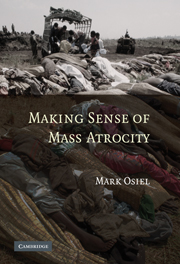Book contents
- Frontmatter
- Contents
- Dedication
- Preface
- Introduction
- 1 The Challenge of Prosecuting Mass Atrocity
- PART I LEGAL RULES AND THEIR PROBLEMS
- PART II THE POLITICAL CONTEXT OF LEGAL CHOICE
- PART III NEW POSSIBILITIES AND SOLUTIONS
- 9 Collective Sanctions for Collective Wrong
- 10 The Collective Responsibility of Military Officers
- 11 Being Economical with Amnesty
- Conclusion
- Index
- References
9 - Collective Sanctions for Collective Wrong
Published online by Cambridge University Press: 15 September 2009
- Frontmatter
- Contents
- Dedication
- Preface
- Introduction
- 1 The Challenge of Prosecuting Mass Atrocity
- PART I LEGAL RULES AND THEIR PROBLEMS
- PART II THE POLITICAL CONTEXT OF LEGAL CHOICE
- PART III NEW POSSIBILITIES AND SOLUTIONS
- 9 Collective Sanctions for Collective Wrong
- 10 The Collective Responsibility of Military Officers
- 11 Being Economical with Amnesty
- Conclusion
- Index
- References
Summary
Current law grapples inadequately with certain characteristic features of mass atrocity, as this study has shown. But the legal intractability of these features is not attributable to any historical novelty, for few of these features are entirely new or even unique to mass atrocity, strictly speaking. The continuing failure to find a suitable solution remains to be explained. What accounts, then, for the intractability?
A first response will likely be that criminal law rests on theoretical assumptions that simply do not fit, do not accommodate the centrally relevant facts. The criminal law assumes a world of unencumbered individuals, independently interacting. A criminal conspiracy, for instance, is not conceived as a self-determining collective subject, but rather as a vehicle through which the wills of individual persons conjoin. As an assemblage of dyads, which form into wheels or chains, it is never quite a truly collective entity with dynamics of its own. Criminal law is inherently about the punishment of individuals for their culpable acts, in this view. Larger processes and structures, intrinsically collective to the core, must therefore be translated or reduced to interaction between such individuals to become intelligible, susceptible to legal analysis.
This reductionism is unsatisfactory because mass atrocity, as Drumbl writes, “requires more than just an extension of the dominant discourse of ordinary criminal law, which embraces liberalism's understanding of the individual as the central unit of action and thereby deserving of blame when things go terribly wrong.”
- Type
- Chapter
- Information
- Making Sense of Mass Atrocity , pp. 187 - 202Publisher: Cambridge University PressPrint publication year: 2009



